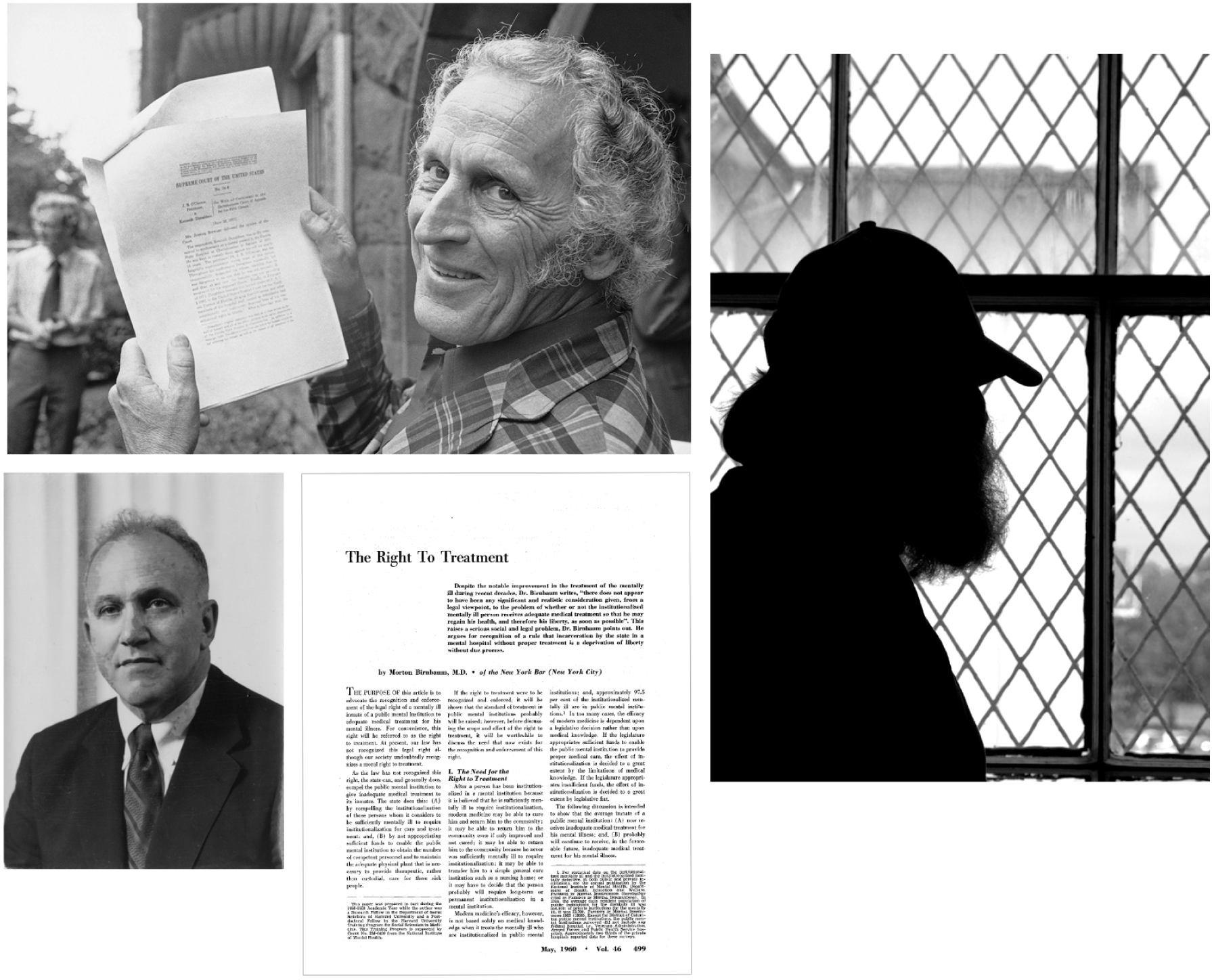When I read about the recent passing of Ricky Wyatt, I felt a sense of grief and a need to reflect on the news. Mr. Wyatt was a state hospital patient in Tuscaloosa, Alabama, who in 1970 became the lead plaintiff in Wyatt v. Stickney, one of several landmark “right to treatment” federal lawsuits, in which state hospital patients, for the first time in history, joined together as a class and turned to our legal system to protest their inhumane treatment. Though I never met Mr. Wyatt, my own history is intertwined with him, as my father, the late Dr. Morton Birnbaum, served as his legal co-counsel in the Wyatt case. We can pay tribute to the state hospital patients of the past by remembering the legal battle to improve their standard of care.
My father, an internist and attorney, introduced the legal concept of a right to treatment in 1960, in an article that he published in the
American Bar Association Journal (
1). He proposed that people with mental illness should have a constitutional right to adequate medical treatment. He asserted that “being mentally ill is not a crime” and that patients involuntarily committed to state hospitals who receive inadequate treatment are being deprived of liberty without due process. He called for the establishment of a standard of care in state hospitals that could improve staffing ratios, to end the “warehousing”—the severe understaffing and overcrowding—that had become the norm. Further, he called for the enforcement of this standard of care through appropriate federal funding.
In the following decades, my father advanced the right to treatment in a series of pro bono cases and class action suits, as patients became lead plaintiffs. In Alabama, Ricky Wyatt challenged the care at Bryce Hospital. In Florida, Kenneth Donaldson challenged the care at Florida State Hospital. In New York, John Legion, Edward Stephens, and other, pseudonymous patients challenged the care at multiple facilities, including Brooklyn State Hospital, Creedmoor Psychiatric Center, and Bronx Psychiatric Center. My father encountered notable resistance along the way. Over 50 journals refused to publish his initial article on the right to treatment, and once the issue reached the courts, angry judges decried his arguments and sometimes evicted him from their courtrooms when he advocated for patients with mental illness.
In contrast to the civil libertarians of the era, my father did not argue for wholesale deinstitutionalization as a solution to warehousing and inadequate care. Rather, he advocated improving care within the state hospitals, and if some patients were to be discharged, then he cautioned for the need for appropriate systems of aftercare in the community.
Kenneth Donaldson's case was ultimately appealed to the U.S. Supreme Court. Mr. Donaldson suffered a “nervous breakdown” at the age of 34, when he was married with three children and working at a General Electric defense plant. Later in life he suffered from paranoid delusions, and in 1957, at his parents' instigation, he was committed to Florida State Hospital at Chattahoochee, where he was diagnosed with paranoid schizophrenia.
In the hospital, there was on average one doctor responsible for the care of nearly 1,000 patients. During his time at Chattahoochee, Mr. Donaldson received “milieu therapy,” which consisted of confining him to a locked room with 60 beds. Mr. Donaldson happened across an article in the New York Times that described my father's legal concept, and in a handwritten letter to my father he beseeched him for his help. My father flew to Florida and began to provide counsel. Mr. Donaldson and my father corresponded over many years, trading hundreds of letters, as my father provided encouragement and legal advice to obtain a writ of habeas corpus. Mr. Donaldson was ultimately released from the hospital by a court order, 14 years after his initial confinement.
After discharge, Mr. Donaldson returned to his hometown in Syracuse, N.Y., and there worked as a night clerk in a hotel while he wrote a book about his experiences,
Insanity Inside Out (
2). Mr. Donaldson continued to stay in touch with my father after his release, joining him at advocacy meetings or on visits to my father's internal medicine office in Brooklyn, where the two would reunite and talk for hours.
Overall, the cases pursuing a right to treatment met promising victories. In 1966, the U.S. Court of Appeals for the District of Columbia recognized the right to treatment in Rouse v. Cameron, when Chief Judge David Bazelon ruled that a right to treatment existed at the statutory level, mandating treatment for a patient committed to St. Elizabeths Hospital. In 1971, in Wyatt v. Stickney, U.S. District Court Judge Frank M. Johnson, Jr., held that involuntarily civilly committed patients are entitled to adequate care and treatment or else they are being deprived of their liberty without due process of law, as required by the Fourteenth Amendment to the U.S. Constitution. The Wyatt court decided that the treatment at Bryce Hospital was grossly deficient and failed to satisfy minimum medical and constitutional standards. Not only was the right to treatment recognized, but the court then ordered a mechanism for enforcement and implementation of the right, which included formal hearings at which amici curiae could submit proposed standards for adequate treatment. In 1974, in Donaldson v. O'Connor, the Fifth Circuit recognized a constitutional right to treatment. However, upon appeal, the Supreme Court did not rule on the constitutionality of the right to treatment and instead decided the case on narrower grounds. Therefore, a definitive legal standard of care for patients afflicted with mental illness has yet to be established at the Supreme Court level.
Today, following widespread deinstutionalization, the concept of a right to treatment continues to shape legal and legislative thinking, as advocates call for a standard of care to be applied to patients with mental illness wherever they receive care—in community mental health centers, in prisons, and sadly, even on the streets. Unfortunately, we are still left with the same unanswered cry for justice that led to the initial articulation of the right to treatment and that gave voice to Ricky Wyatt, Kenneth Donaldson, and other state hospital patients: Can a standard of humane medical care for the most vulnerable patients afflicted with severe mental illness be established and enforced?
Acknowledgments
Photographs used by permission of Corbis (Kenneth Donaldson), the Alabama Disabilities Advocacy Program (Ricky Wyatt), the American Bar Association (journal page), and the author (Morton Birnbaum).


